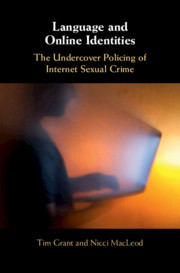Book contents
- Language and Online Identities
- Language and Online Identities
- Copyright page
- Dedication
- Contents
- Figures
- Tables
- Preface
- Acknowledgements
- Table of Legislation
- Table of Cases
- Chapter 1 Introduction
- Chapter 2 Data and Methods
- Chapter 3 Experimental Results
- Chapter 4 Training Identity Assumption
- Chapter 5 Resources and Constraints in Abuse Identity Performance
- Chapter 6 Contexts for Linguistic Investigative Advice
- Chapter 7 Implications and Future Directions
- References
- Index
Chapter 1 - Introduction
Published online by Cambridge University Press: 10 February 2020
- Language and Online Identities
- Language and Online Identities
- Copyright page
- Dedication
- Contents
- Figures
- Tables
- Preface
- Acknowledgements
- Table of Legislation
- Table of Cases
- Chapter 1 Introduction
- Chapter 2 Data and Methods
- Chapter 3 Experimental Results
- Chapter 4 Training Identity Assumption
- Chapter 5 Resources and Constraints in Abuse Identity Performance
- Chapter 6 Contexts for Linguistic Investigative Advice
- Chapter 7 Implications and Future Directions
- References
- Index
Summary
Chapter 1 provides a general introduction to the book, outlining the need for police investigators to engage in online identity assumption and justifying a linguistic contribution that can be made in terms of the variety of ways in which linguists and forensic linguists have approached questions of language and identity. We set out the context of online sexual abuse, in particular the abuse of children.
Keywords
- Type
- Chapter
- Information
- Language and Online IdentitiesThe Undercover Policing of Internet Sexual Crime, pp. 1 - 25Publisher: Cambridge University PressPrint publication year: 2020

